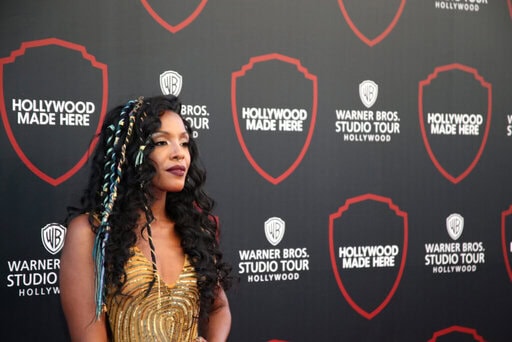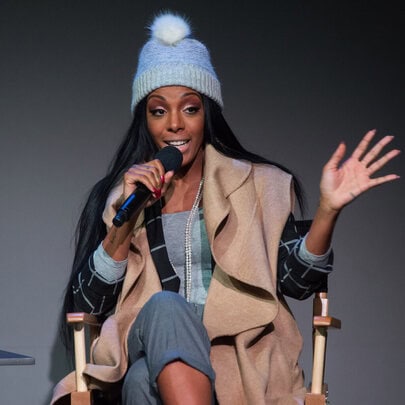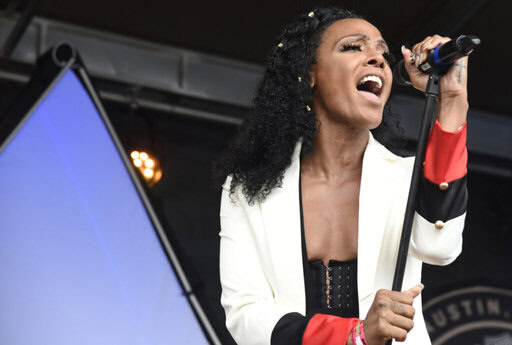The former Danity Kane member spoke with Boardroom about her work with the Hip Hop Caucus and how hip-hop and activism work hand-in-hand.
You may recognize the name Dawn Richard from the famed it girl group of the 2000s, signed to Diddy‘s Bad Boy Records and known as Danity Kane. You may know her from her solo endeavors as an Afrofuturistic artist following the creation of her own imprint under the name D∆wn for her “intergalactic pop fusion” sound. Now, the former Making The Band reality-star-turned-pop-star is taking her talents from the studio to the boardroom as the Hip Hop Caucus‘s newly appointed Artist Relations Director to amplify the voices of impact found in the hip-hop community, while creating a safe space for artists, from up-and-comers to veterans

One of the first orders of business for the New Orleans native as she transitioned into her new role was the curation of “The BASEMENT,” an intimate new series that brings creatives together to cultivate, communicate, and campaign for community and culture, including a sit-down conversation with an artist around relevant advocacy issues. Live from the Hip Hop Caucus’s Instagram account, Grammys week brought forward a conversation for “The Basement,” featuring performances by Saint Elgin and India Shawn, a couch conversation with FX’s Pose star Angelica Ross, and DJ vibes from rising household name Amorphous.
“I’m really proud of this. [We’re] having these series and giving these younger artists opportunities to say, we’re not afraid to be in this space and grow together,” Richard told Boardroom about the growth of The BASEMENT series, which has also included Tanerélle, SAMOHT, dream hampton, and Samuel Green. “These are all younger artists who have gotten all their thoughts, they’re all independent, they’re a new generation of what the artists are and unafraid to speak on the things that they believe in. There’s no cameras, there’s no press, this is open and free, and you get to come in and take the industry out of it.”
Boardroom caught up with the former Diddy Dirty-Money member to learn about artist relations at the Hip Hop Caucus, how hip-hop and advocacy work together within the Black community, and how her own experience in the music industry led her to where she is today.
D’Shonda Brown: How did you become involved in the Hip Hop Caucus, and tell me more about your role as the Artist Relations Director.
Dawn Richard: I was fortunate enough to recognize them and I did not know that 15 years later, I’d be part of them. When I went through [Hurricane] Katrina, we were struggling, we were living in a car, we were homeless, and we were seeing all these people make investments. All these white men, right? With white men buying properties, we were seeing devastation and yet no one really helping us. Everyone was climbing to get photo opportunities. Meanwhile, we were dying. Meanwhile, we were losing people and it was really hard to understand that we were a US state being treated like refugees and one of the first organizations that I saw that was actually doing something really powerful was Hip Hop Caucus.
This is the first time you’ve seen any Black organization or anyone specifically to care for us as Black people. 15 years later, I never thought I would ever see them again, but I recognized who that was my first introduction to who Rev. Yearwood was and what it meant for Black people to show up. I had not seen anything like that from anyone else, especially our own government. 10, 15 years later, I’m going through my journey as an artist and I’m looking for an opportunity to pay it forward. I had tried to do it during Danity Kane and Dirty Money, but my career was just so unconventional. There was so many things happening. Us being broken up on national television, coming back from tour with no money — it was just constant trauma that I never got an opportunity to give back to the city and grieve.

As an independent artist, I had way more control over my career because as an independent artist, I’ve been able to map out the culture and career that I want and define my journey of success. There was things that I wanted to do and give back. Lo and behold, Hip Hop Caucus opened the artist relations job and I felt like the universe was telling me this is my opportunity. This is an opportunity to like pay it forward, educate, learn myself what my state is really going through, through environmental justice, why Katrina happened, why so many other states like Louisiana are dealing with things like chemical abuse. And this is an opportunity to do that.
DB: What from your years of experience in the music industry have you brought to the Hip Hop Caucus?
DR: People have seen my story. I always say this is just not conventional, but I’ve been able to have mainstream success as well as independent success. I know what it means to have a major budget and being with the best of them in the scope and Atlantic [Records and] Bad Boy. I also know what it means to have none of it like DIY to the grassroots power and have to figure it out. I think I bring to the truth of both. I understand both the label artists [and] I understand the independent artists. I also understand what it means to have to hustle. I know what it means to be homeless. I’ve experienced severe trauma with losing everything in Hurricane Katrina to live in a space. I’ve witnessed death through that.
I also know what it means to come off of a tour and your business manager be indicted and you lose millions, how do you figure that out, and not understanding wealth or finance and where to put those things? Honestly, if anything, I’m bringing the truth to this job. I think I’m creating the new concept of what a musician can be in this industry. That you can be an artist, but also an entrepreneur that can work within an organization and a nonprofit, and still be very much a successful musician. I think bigger than anything, it’s authentic. I’m just telling my story and hoping that others can see the power, the healing I have through doing it, and the information that I’m getting. Hopefully, they see the pay-it-forward and they wanna do the same. Maybe I can create a safe space for them, like I didn’t have, and now I’m starting to have this in Hip Hop Caucus.
DB: Why is it important to not only talk to hip-hop artists, but talk to the people who are the power behind the hip-hop artists, such as people in communications and talent relations?
DR: I think it’s important for us to know we have options and I think specifically as artists, we tend to look linearly into what we can possibly do. Because we sometimes as creatives and artists don’t trust the political lens [and] because a lot of us come from places where we feel like we have been undervalued, let down, we don’t believe what society has given us, and therefore we escape through our art. We tell our stories through our art. We tend to live in silos and when I say silos, we create organizations and we do pilgrimages within our own institutions, but we don’t give it to each other. It’s something that I really applaud Hip Hop Caucus for doing, is that they give you the opportunity to learn, to educate yourself, and one of the most attractive things to me was justice paid in full.

These opportunities for us to learn about Black banking and environmental justice. All of these things are consistent to us not knowing. I had no idea that those things were happening because they’re not educating us. I think in our culture, a lot of us artists are coming from these places and they don’t have the information or the knowledge, and they don’t feel comfortable trusting it with anyone but people who look like them. Again, I think it’s important for a place that is curated by us, for us, is a space for artists like me and to bring artists like me to the space to say, Look, you have a safe haven. You have a safe space to learn about your ancestors, about what it is that’s going on in your state, and how you can help be a voice, be a messenger, and use your arts to do it.
DB: We know that hip-hop can be a very male-dominated space, but why is it important to include women and femme-identifying persons in conversations about hip-hop?
DR: I think I’ve been very intentional with that, even with our initiatives that we’ve done. We just did something with Bloomberg [Philanthropies] where they did an Innovative Earthshot conference in New York where they were giving a prize for the most innovative, sustainable engineering organizations — some of the best in the world. I thought it was important to have a muralist and so when they came to me as artist relations, they said, who do we think we should get? The first person I thought was a Black woman in her artistry. I think it is so important that we leave opportunities for Black women, queer women, queer trans, anything in that space who have been under undervalued and unseen in the artistic space to let them shine here because their stories are so important.
Especially something like the Earthshot Prize, which was beautiful, but it was predominantly white. It was really powerful to have a Black woman in that space tell her story about being from New Orleans, getting a full ride to Pratt, her family living in Cancer Alley, and her telling her story through her mural. It is needed. It shows a story way beyond just what people perceive Black culture and hip-hop to be. It was a beautiful line to say this is a young lady from an inner city school, had to get full scholarships out of her journey, and then get a full ride to Pratt through her art, right through her self-expression to tell those stories. All her art is Black ancestral and indigenous women.
That is why females in hip-hop is important, because our stories have empathy, they have real true meaning. Black women have been saving society since the beginning of time. Until we have that dialogue that it is gonna take avenues and spaces like Hip Hop Caucus to be intentional with having Black women, queer women, LGBTQIA+, [and] those types of communities telling stories in the forefront, that’s the only way this moves. Hip-hop to me is that it’s beyond just music — it’s a lifestyle and it is our stories. It’s our stories that make hip-hop evolve into what it is now.
DB: More on the frame of hip-hop, how do you see hip-hop, activism, and advocacy work hand-in-hand?

DR: Voice, lyricism, and community stories. Hip-hop to me, basically was people, rappers, lyricists. It’s not just rappers; spoken word poets sitting in a space telling the stories of their trauma and their success and recovery from that trauma. That was the beginning of hip-hop — true stories, community stories being told within each other, and what it has evolved now into is realizing, especially with social media, that our trauma should be spoken about, acknowledged, and how do we gain recovery and success from it? How do we get generational wealth through knowledge and financial wealth as well? Us having that same rapport on those same circles, those same moments where we can speak our lyrics, speak our stories, and having the safe spaces to do it.
Because in early hip-hop, right, it was basketball courts, it was on benches in front of your porch in New Orleans. These were the safe spaces where we could talk about our trauma through a beat. Or the way we wore our hair, the way we wore our nails, how we talked to each other, how we did fashion within each other, how we expressed ourselves when we have money, how we made our own clothes. This has evolved into how do we tell our stories on a way larger scale? How do we educate each other beyond just fashion, art, and film? How do we educate it through finance? How do we educate it through policy? How do we educate it through information [and] knowledge?
I think Hip Hop Caucus has become this space where we can cultivate and have art, fashion, hip-hop, all that in a space where we can also educate and have the knowledge. That’s the missing piece that has been keeping us backwards. This is an opportunity for the new, especially Generation Z and millennials, to know that they have a safe space to move us forward. We know our trauma and past stories, but it’s us. It’s connecting our ancestral stories to what the future may hold for us. I’ve really seen a really big pulse with Generation Z wanting to know the truth [and] being vocal about how they feel about the climate of things. It’s important that we aren’t preachy. We’re just saying, here’s a space instead of going on social media. Instead of doing it within your own silos, why don’t we come together and have the discussion? Why don’t we come together and have the dialogue and say, how do we affect change for each other in hip-hop and the culture?
DB: What are your thoughts on how hip-hop has responded to the murder of Tyre Nichols, and how do we continue to use hip-hop as a safe haven for the Black community during these times?

DR: Hip Hop Caucus has already put our statement out. I think that it is important that organizations help our culture speak continuously to it. If there’s safe opportunities for us to get out there and show our voices and rally in a peaceful way, I think that’s powerful. I also think that through art, through song, through conversation, any way we can express that this is ridiculous and that we’ve had enough needs to be done. It has to continue. We as a culture need to start building our own safe spaces and stop relying on others to give us those safe havens, which is why this is a start. Having the education, having people to be able to feel like they can go and commune in large spaces and feel safe within those walls to have dialogue and build and understand.
Knowledge is key here. Us understanding how powerful our culture is, how we can grow financially, how we can get wealth, how we can teach each other, build schools together, build banks together. Because even though that is separate from this, it isn’t right. If we understand our power as a community and we start building our own networks, our own wealth, we can have a more peaceful way of living and not rely on those who hurt us. That’s a deeper conversation that I know we can have as a community. I really believe the more we own, the more we have our own backs, the better we’ll be. In the meantime, we don’t stay silent. We stay firm. We keep fighting the good fight through our word, through our art, through our hip-hop, through our culture, through our lifestyle. It’s imperative that we never stopped voicing that this is enough.
Read More:
Read More:
- Andre Ward is Still Writing His Story
- Chet Holmgren Has Been Studying the Sneaker Game for Years
- Learning on the Fly: How Chet Holmgren is Spreading His Wings in OKC
- Chet Holmgren: Student of the Game
- Shai Gilgeous-Alexander, Converse Set to Make More History Together